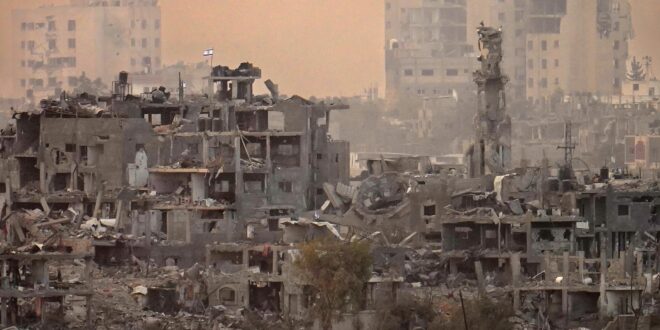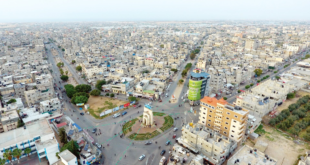In-depth: Israel has failed in its objective of destroying Hamas, with the group likely to retain influence in post-war Gaza but not be its sole ruler.
After ten months of a devastating Israeli war, Palestinians are increasingly aware that Hamas, the Islamist group that rules the war-torn coastal enclave, will not remain in sole control of Gaza when the fighting ends.
Since 7 October 2023, when Hamas-led Palestinian factions carried out a sudden and unprecedented attack on Israeli towns that killed 1,200 Israelis and saw 240 taken as hostages, Israel has waged a large-scale war on the Gaza Strip.
Israel’s army has carried out systematic war crimes during its operations, with UN experts and human rights groups accusing Israel of committing genocide. More than 40,000 Palestinians have been killed, including 15,000 children, with the majority of the Gaza Strip decimated and most Gazans internally displaced.
Since the beginning, Israeli Prime Minister Benjamin Netanyahu has insisted that one of the war’s aims was to destroy Hamas so that it wouldn’t exist either politically or militarily the ‘day after’.
In February, as part of his long-awaited post-war ‘plan’, Netanyahu called for the complete “demilitarisation” of the territory, indefinite Israeli security control, and a civilian government to manage the affairs of its residents and distribute aid.
Earlier this year, Israel claimed that it had destroyed 20 out of the original 24 Hamas battalions in Gaza. However, more recent data shows that nearly half of its battalions in northern Gaza and central Gaza have been rebuilt and Hamas has been able to reconstitute its fighting forces and continue to inflict military losses on the Israeli army in Gaza.
“There is no vacuum in Gaza, Hamas is still the prominent power,” Michael Milshtein, a former colonel in Israeli military intelligence who now heads the Palestinian Studies Forum at the Moshe Dayan Center, told Reuters last month.
In short, Netanyahu has failed to achieve his stated objective of destroying Hamas.
As the war continues with no end in sight, the international community and Arab countries have been searching for a viable post-war plan for Palestinian-led governance in Gaza, including responsibility for security, food, aid, and civil affairs.
In June, in an interview with US media, Netanyahu said that the implementation of a civil administration in Gaza would need the “cooperation of an inter-Arab sponsorship and assistance by Arab countries”.
As part of US-led efforts, Egypt and the UAE had reportedly signalled their willingness to be part of a post-war security force, with their conditions being a pathway to a Palestinian state and the approval of the Palestinian Authority (PA).
Western states have generally favoured a revamped PA running Gaza, but Netanyahu has consistently rejected the idea. The PA, meanwhile, insists that Gaza is part of the occupied Palestinian territories that fall under its administration and that the ‘day after’ in Gaza is an internal Palestinian affair.
Israel has also suggested that the heads of powerful local families be part of a post-war governance structure, but they have rebuffed Tel Aviv’s proposal.
Hamas before 7 October
Before Palestinian elections in 2006, for many Palestinian, Arab, and international observers the idea of Hamas participating in governance, let alone running the Gaza Strip, would have seemed implausible.
After Hamas won the Palestinian legislative elections in 2006 with a majority of seats, international sanctions were imposed on Palestinians and aid was suspended. Rounds of fighting with security services loyal to the Fatah-dominated PA led to Hamas seizing control of Gaza in 2007.
“At the time, Hamas’s [election] victory came as a natural response to the corruption of the Palestinian Authority’s institutions politically, economically, and administratively,” a Palestinian based in Gaza told The New Arab.
For Mohammed Halawa, who is also based in the coastal territory, perennial corruption within the PA is a fundamental issue.
“I am a member of the Fatah movement, but I decided to vote for Hamas because of the corruption that is widespread in all state institutions. We lost security and safety, and those with political influence were the only ones controlling the country,” he told TNA.
Voting for Hamas was a way to punish the PA, Halawa said, with Hamas raising the banner of change and reform and maintaining a platform of resistance against the Israeli occupation.
“Unfortunately, since Hamas took power, our lives began to deteriorate throughout the last 17 years, starting with the Palestinian division and Israel imposing a tight siege on us and the deterioration of our living conditions.”
Seven large-scale wars during that time, including the ongoing Israeli destruction of Gaza, have made life unbearable for Palestinians.
While disagreeing with Hamas politically, Sameh Abu Shaaban, a resident of Gaza, still supports Hamas during periods of conflict with Israel and views armed resistance as the only way to liberate the Palestinian territories due to Israeli intransigence.
“But unfortunately, Hamas was involved in wars without having prior goals that it sought to achieve or political gains that could be relied upon after the war,” Abu Shaaban said.
“We were losing our Palestinian capabilities, our loved ones, our homes, and our security without achieving anything, only destruction and death are what we reap.”
For Abdul Hai, who preferred to keep his family name anonymous, war has been imposed on Hamas by Israel, the United States, and its Arab allies to end the concept of armed resistance in favour of the PA, which has chosen the route of diplomacy, but with little to show for it.
“Even without Hamas, Israel was, is, and will continue to kill the Palestinian people for nothing but to empty the Palestinian lands of their original inhabitants and establish its extremist Jewish state on our lands,” Abdul Hai told TNA.
Israel’s wars on Gaza
Since 2008, Hamas and Palestinian armed factions have been involved in seven large-scale wars in the Gaza Strip, in which Israel has destroyed tens of thousands of Palestinian residential buildings, killed more than 60,000 people, and injured more than 200,000 others, according to statistics from the Palestinian Ministry of Health in Gaza.
After each war, Hamas’s popularity has waned in Gaza while rising in the West Bank. During the ongoing war, even more critical voices in Gaza have emerged, accusing the movement of lacking judgement by launching an unprecedented attack on Israel without any clear objectives, especially given most regional Arab regimes’ hostility to the idea of armed struggle.
According to a survey conducted by the Ramallah-based Arab World Center for Research and Development (AWRAD) in May, only 24% of Gazans had “positive” feelings about Hamas’ role, a drop of 36 points from a poll conducted in November.
“The collapse of support in Gaza led to a drop in the overall average (for Palestinians in the West Bank, Jerusalem and Gaza) by more than 20 points, to 55 per cent who now rate Hamas’s role positively, compared to 76 per cent in November,” AWRAD said in a press statement.
“It is natural for the movement’s popularity to decline in light of the war, especially since Israel has deliberately inflicted the largest possible number of civilian casualties under the pretext that it is fighting Hamas, but in reality, it is fighting Hamas’s popularity and wants the Palestinians to point the finger of blame at the movement,” Hussam al-Dajani, a Gaza-based political analyst told TNA.
“Such polls cannot be relied upon during wartime, as they may change after the war ends according to its results, in which Hamas may achieve a real victory for the Palestinian people, at least on the national level,” Al-Dajani added.
So far, Israel has failed to achieve the war’s goals of overthrowing Hamas’s civil and political rule, undermining its military arsenal, and returning Israeli hostages.
“The data from the war so far indicates that it is very difficult for Hamas to disappear from Gaza in one form or another if the war ends,” Joost Hiltermann, director of the Middle East and North Africa program at the International Crisis Group think tank, told TNA.
“It is certain that Hamas will remain in one form or another. Even if it is weakened or wiped out from Gaza, it will be able to survive in the West Bank and the diaspora, as it gained great popularity after the events of 7 October 2023.”
Hamas’s rule over Gaza
Palestinian political analysts say that Hamas cannot rule the Gaza Strip alone, especially after the destruction of most of its military arsenal and the killing of its local leaders. It will not, however, give up its participation in governing the territory. This is also clear from its demands in the ongoing ceasefire talks.
Analysts agree that no party, whether the Palestinian Authority or the Israeli military administration, can rule and control Gaza without Hamas, or fill the administrative and civil vacuum. Accordingly, Israel must recognise this, and if the Palestinian Authority wants a foothold in Gaza, it must involve Hamas.
“Hamas is an important part of the Palestinian national movement and cannot be excluded,” Hani al-Masri, director of the Palestinian Center for Policy Research and Strategic Studies (Masarat), told TNA.
The group will play an important role in any ‘day after’ in Gaza, especially if it becomes part of the Palestine Liberation Organisation (PLO), al-Masri added. This would also undermine efforts by Israel to exacerbate the Palestinian political divisions of the last two decades.
However, such political unity still appears to be out of reach, with efforts to bridge the gap between Fatah and Hamas failing to make progress, both before, and after, the Gaza war.
 Eurasia Press & News
Eurasia Press & News



